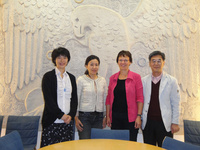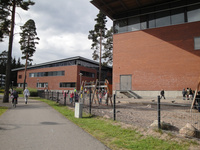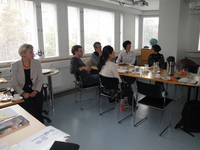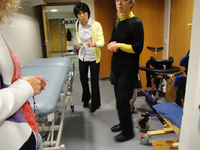Study on Finland welfare and education
HOME > Research and other medical related news > Research and accomplishment
Study on Finland welfare and education
Dr. Yukiko Seki( Faculty of education at Saitama University)
Our aim of visiting Finland is to know what education for disease children and support is conducted. That’s the main reason to leave for this country. This is far from special needs for disease children. We find that it completely consists of education theory and energetic activities form school teachers.
 The principle of education theory in Finland
The principle of education theory in Finland
Their ultimate goal is to raise children who are responsible for society in the future and provide educational chance that is suitable or appropriate for each of them. I vividly remember impressive words from our interpreter. There are little resources except forest and human-beings in Finland. Unfortunately, forest area in Finland has been getting lost recently. Her sayings boil down to the fact that human-being is valuable resource in Finland. Above all, children are our treasure. In order to bring up them, Finland adults have a responsibility to provide a proper educational chance for children. I think this national policy is easily acceptable and prevailing to all of them .
Many adults cooperatively support for each of children.
If there is child who is special needs in class, specialist always accompanies with her/him.
Let me tell you as a real example.
If there were 2 children who need special assistance, one teacher, 15 children and 2 specialists would be there. If there were 7 children with special needs, there would be ultimately one teacher, 7 specialists and 15 children.
In fact, I saw the number of adult including teacher and special assistants more than children in one class.
When facing this situation, It reminds me of class room chaos in Japan. One teacher and children ranging from 30 to 40 is stacked in tiny room and always required for being obedience in school. This is utterly cruel situation. If child were fed with the discipline and order, he/she would be more likely to be labeled as trouble maker and ill-discipline one in school.
When I asked Japanese educators about acceptance of disease children in school, most of them answered old excuses as follows: we can’t afford to stare at only him/her in particular or disease child should be hospital until he/she is cured completely.
The problems such as chronic shortage of human resources and strict school regulations eventually force disease children with special needs to feel ashamed.
 Coordination system by supporters
Coordination system by supporters
It is amazing for me to know regular weekly meeting for children with special needs is held in Finland.
Associate participants such as teacher, administrator, nurse teacher, clinical psychologist, physician, guardians and other specialists deal with each of children. Naturally, expert meeting is regularly held in nursery school, elementary school and vocational school.
When asking support system for disease children, nurse teacher told that we did my best to coordinate with a various kind of experts. And when asking them in more detail, It reveals that this is nothing but ternary relationship, consisting of principle, teacher and nursing teacher. I think that their collaboration is only contact and report rather than cooperation.
Furthermore, I found many problems below.
1) They couldn’t afford to disease children due to their busyness. 2) Even relationship between teachers doesn’t work well. 3) They feel embarrassed to consult with primary physician and medical services. 4) They don’t feel special needs and cares from disease children.
I propose some problems behind Japanese education system. Firstly, Japanese teachers can’t understand special necessity from disease children. Secondly, they can’t provide disease children with a proper coordination between necessary relevant organization and specialists even though they understand their special needs. In addition, teachers can’t recognize importance of its coordination.
 Finnish teachers have a passion for education
Finnish teachers have a passion for education
I am currently belonging to faculty of education at Saitama university and have an opportunity to talk with may principals, vise-principals, teachers and nursing teachers in school. After discussion, I mostly often face many obstacles and cooped-feelings from them. That is mainly caused by their limited discretion.
If they introduce an innovative plan to school, things don’t go smoothly because of blockades such as approval from principal or school board. I often hear this discrepancy from guardians, support organizations and other health care experts and teachers.
We visited admirable schools or facilities for alien inspection and met school administrators as well as many ordinary teachers this time.
I was highly impressed that Finnish teachers are proud of their education and have a confident in explaining the contents to alien visitors like us.
I realized that lack of Japanese teachers is passion and quest for education in comparison with Finnish teachers.
With the respect to support for disease children, Japanese teachers often complain that we have no time, no human resources, no know-how, no money and no assistance. Although Japanese teachers have no time, no human resources and no money, they have a potential ability to acquire knowledge and technical know-how. However, we have many extraordinary talented teachers, excellent facilities and polished systems.
If these would be integrated and organized, difficult problems would be cleared and diminished immediately.
Although we need teachers with high ability, the important and fundamental point is active consciousness more than personalized discretion in order to find and solve the problems.
 Children rely on adult.
Children rely on adult.
When seeing many adult support children in school, it reminds me of words from teacher dealing with special needs towards children with mental disorder.
According to his/her words, children with mental problem have been labeled as “trouble maker” by classmates and teachers in ordinary class or school. They have suffered and lost any and all faith in human-beings, resulting in going to school in hospital during hospitalization. The first thing we have to do is to restructure trust and relationship. We develop tools and materials in order to gain a reliable adult or teacher for them.
After hearing his/her comment, it brings to my mind and creates an image that children suffering from trouble have been isolated from school and distrust of adults. Surprisingly, I have never seen such a situation in Finland.
Children with trouble are not isolated but protected from many adults around. When they fall into something trouble and need support, many adults gather and discuss how and what to rescue them.
Finnish children understand their cordial support and grow up despite even class in school.
 Further studies
Further studies
After studying survey on Finland education system,
I ask myself a question. What should I do or What I can do in Japan. Since I am engaged in fostering of teachers at Saitama university, I made a decision to train all teachers, not depending on children and guardians.
One teacher involving in special needs education told us that decision should be made by guardian and children so teachers should not do that.
If teachers urge children to go to special needs school not but ordinary school due to their reason and convenience, children are unable to adapt school smoothly. Based on support from teacher, children and their guardians preferably have a better understanding benefit from special needs school following ordinary school firstly, resulting in choose their course for themselves.
Our ultimate goal is not only to bring up a teacher who absolutely opposes special needs but also provide them with a variety of fruitful supports such as training, getting from impossible to possible.


 お問い合わせ
お問い合わせ